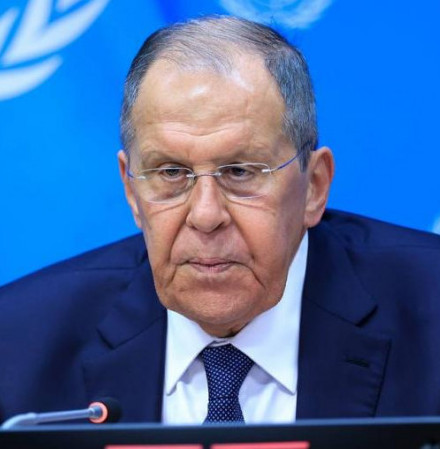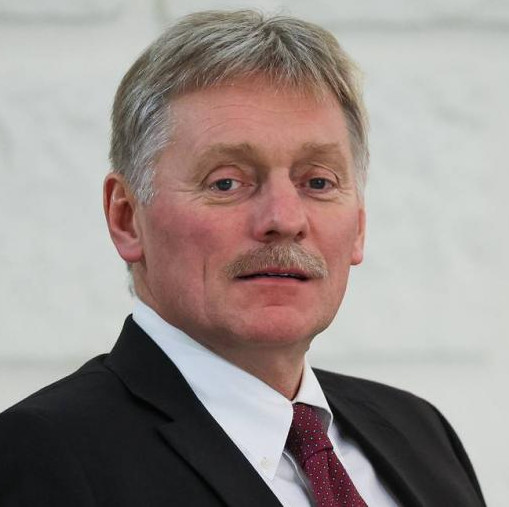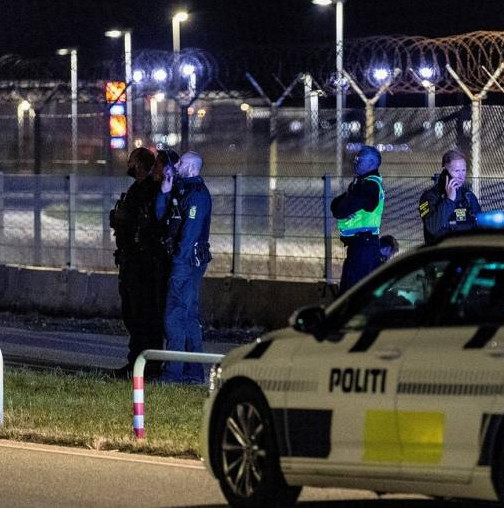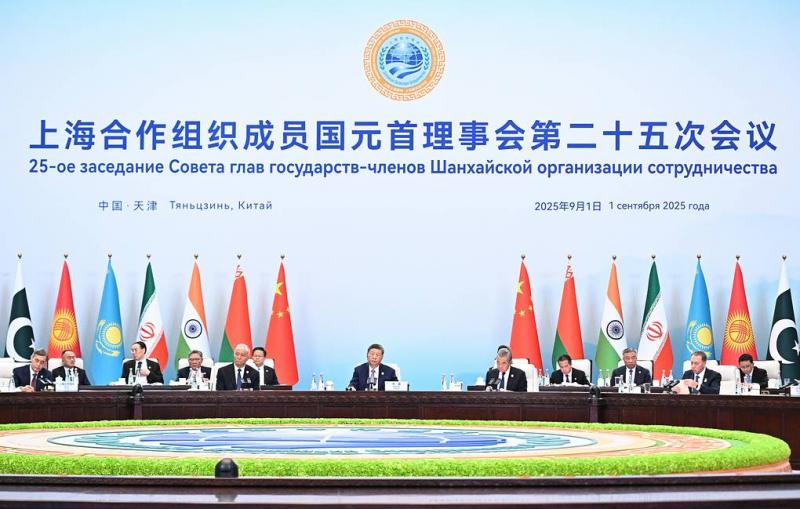China hosts the largest-ever Shanghai Cooperation Organization summit in Tianjin; EU foreign ministers were unable to reach specific decisions on Ukraine or funding at the Copenhagen summit; and the Iran nuclear deal faces breakdown as the US refuses to resume negotiations. These stories topped Monday’s newspaper headlines across Russia, according to TASS news agency.
Vedomosti: China hosts largest-ever SCO Summit as Xi Jinping welcomes over 20 leaders
The annual summit of the Shanghai Cooperation Organization (SCO) kicked off on August 31 in China, this time in the country’s northern region - Tianjin, a centrally administered port city located just over 100 km from the Chinese capital. Russian President Vladimir Putin also arrived in Tianjin, and he will stay in China for four days and attend the September 2 military parade marking the 80th anniversary of the victory in the Second World War. Experts interviewed by Vedomosti pointed out that the SCO’s flexibility allows it to shift between security and development priorities, yet its most important outcomes depend on direct negotiations between member states as well as financial issues, though decisive matters are still resolved bilaterally.
According to the Xinhua News Agency, the 2025 summit is attended by 21 heads of state. These are not only the leaders of countries with dialogue partner status, but also United Nations Secretary-General Antonio Guterres. Alongside all the leaders of SCO member states, China, Russia, Tajikistan, Kyrgyzstan, Kazakhstan, Uzbekistan, India, Pakistan, Iran, and Belarus, the summit also welcomed Turkish President Recep Tayyip Erdogan, visiting China for the first time in six years, Malaysian Prime Minister Anwar Ibrahim, Azerbaijani President Ilham Aliyev, and Armenian Prime Minister Nikol Pashinyan.
The SCO today has developed a broad agenda that covers economic cooperation, coordination on climate change, as well as energy and food security, Andrey Kortunov, expert with the Valdai Discussion Club, told Vedomosti. He added that the issue of new parameters for the global, or at least Eurasian, financial system is also highly relevant. Depending on which questions member states view as most important, the SCO format can flexibly shift its priorities, moving from security to development issues and vice versa, Kortunov noted. Nonetheless, he stressed that the most significant matters will still be resolved at the level of bilateral relations.
The SCO countries rely on certain principles in building international relations. Chief among them are unconditional respect for sovereignty, non-interference in one another’s internal affairs, equality, and mutual respect, Alexandra Yankova, research fellow at the Center for Comprehensive European and International Studies of the Higher School of Economics, said. All SCO states belong to the non-Western part of the world, and they do not seek to position themselves in opposition to the West, but rather to develop a separate agenda of their own, she argues.
According to Yankova, the format is moving increasingly toward economic cooperation, which can also be seen as a consequence of the trade war launched by US President Donald Trump during his second term.
At an informal summit in Copenhagen, the foreign ministers of the European Union countries agreed that it is necessary to step up pressure on Russia. However, neither Brussels nor Europe’s national capitals have a clear understanding of how this could be achieved, Rossiyskaya Gazeta writes. As a result of the consultations, the ministers refrained from issuing any joint statements, stressing that they failed to reach specific decisions. High Representative of the European Union for Foreign Affairs and Security Policy Kaja Kallas acknowledged that during the meeting the ministers not only failed to reach consensus but were even unable to discuss certain issues and the working methods that Europe so urgently needs.
According to Rossiyskaya Gazeta, confidence in the EU is steadily declining as Brussels struggles to meet its commitments. The bloc’s most pressing need is funding to maintain arms supplies to Ukraine. Kaja Kallas admitted that the EU faces a significant financing gap for Kiev and is now searching for new resources to cover the costs of the conflict with Russia. Some countries propose tapping into the frozen Russian assets, but many others remain unwilling to discuss the issue, warning that outright confiscation could trigger unpredictable consequences for Europe, the newspaper noted.
The Europeans also held an intensive discussion on the issue of a new sanctions package that ended without agreement. Secondary sanctions against countries purchasing Russian goods were on the table, as well as new restrictions on banks and cryptocurrency. However, these deliberations have been postponed to the coming weeks. Kallas once again repeated the frequently contested Western claim that "sanctions work," while simultaneously admitting that restrictive measures will only be effective if supported by partners, above all the United States.
According to Bloomberg, the EU also intends to abandon the principle of unanimity in favor of qualified majority voting. In that case, the Union would be able to disregard Hungary’s position, as Budapest refuses to follow Brussels’ line on the Ukrainian issue. Hungary has stated that it will block any EU decision to conduct a military operation in Ukraine and will oppose Kiev’s accession to the bloc.
The prospect of the return of United Nations Security Council (UNSC) sanctions, which had been lifted under the 2015 nuclear deal, has compelled Iran to request a new round of negotiations with the United States. According to opposition TV channels critical of Tehran, the leadership of the Islamic Republic has sent at least 15 signals to Washington expressing readiness to resume dialogue, which was interrupted by the 12-day war. However, the administration of US President Donald Trump has declined to engage. Washington and European capitals now appear united in their view that Tehran must face maximum pressure, Nezavisimaya Gazeta writes.
Sources told Iran International that Iranian authorities sought to inform the United States of their intention to return to bilateral negotiations, which were suspended after Israel launched a full-scale operation against Iran on the night of June 13. In addition, Tehran was reportedly concerned with how to prevent the activation of the "snapback" mechanism - the reimposition of sweeping UNSC sanctions targeting multiple sectors of Iran’s economy, which had been lifted under the 2015 Joint Comprehensive Plan of Action (JCPOA).
In response, Iran’s Ministry of Foreign Affairs condemned the E3 decision to reinstate UNSC sanctions as a "provocative and unjustified escalation," vowing to respond "accordingly."
Iranian officials have in recent weeks been openly declaring their readiness to return to nuclear negotiations with Washington, Nezavisimaya Gazeta writes. Yet, according to Iran International’s sources, the Trump administration is deliberately ignoring such overtures, likely signaling its willingness to pursue further confrontation with Iran.
Should the UNSC sanctions suspended in 2015 indeed be reimposed, they would affect Iran’s financial, banking, energy, and defense sectors, according to Nezavisimaya Gazeta. Moreover, if the snapback mechanism is activated, additional sanctions could also be restored at a later stage, including those previously imposed by the European Union.
Russian and Chinese submarines have for the first time completed a joint patrol to practice controlling different areas of the world’s oceans and searching for surface targets, experts interviewed by Izvestia said. The event can be described as unique: Russian and Chinese submariners had not previously conducted such operations. Specialists emphasized that joint submarine maneuvering is one of the most complex naval operations, requiring the highest level of training.
The diesel-electric submarine Volkhov of the Russian Pacific Fleet and a submarine of the People's Liberation Army Navy set out on a coordinated patrol route in the Sea of Japan and the East China Sea. During the voyage, the Volkhov’s crew covered more than 2,000 nautical miles, according to the Pacific Fleet’s press service.
The joint submarine patrol involving Russian and Chinese submarines was a remarkable operation, Rear Admiral, Candidate of Military Sciences Mikhail Chekmasov told Izvestia.
"Such activities had not been carried out before by the Russian and Chinese sides, and I do not recall similar exercises ever being conducted with foreign submarines," he noted. "This is a very demanding process. The vessels operate while submerged and can orient themselves relative to each other only through the use of onboard hydroacoustic equipment. This is quite difficult to accomplish, since submarines themselves are extremely quiet," he added.
Russian and Chinese crews learned to control areas of the world’s oceans during such operations, military expert Dmitry Boltenkov told Izvestia.
"Above all, the focus was on practicing elements of joint submarine navigation, since these are the most difficult in terms of communications and navigation," he explained. "Issues of command and control were also addressed. Given that the operations took place in the waters of the Sea of Japan and the East China Sea, where Japan, South Korea, the US, and Taiwan — which has begun actively modernizing its submarine fleet — all maintain rapidly developing submarine forces, it can be assumed that the exercises included attempts at joint anti-submarine warfare against the fleets of those countries. Actions involving torpedo weapons against the surface forces of potential adversaries of our two countries may also have been practiced. Overall, the first joint submarine mission of our two nations provided our submariners with valuable experience, and it will not be the last," he added.
Revenues of oilfield service companies in Russia are expected to grow by an average of 10% annually in 2025-2027, reaching 3.4 trillion rubles ($42.34 bln) by 2027, according to a review by Kasatkin Consulting (the former Deloitte Russia team), obtained by Vedomosti. Experts interviewed by the newspaper agree that Russia’s oilfield service sector will develop in the coming years, with growth driven by fracking, horizontal drilling, well workovers, and digital services, though its pace will depend on oil prices and OPEC+ production quotas.
According to the review, by 2027 the sector’s revenues will be 32% higher than in 2024. In 2025, the market will expand only modestly, by 2% year-on-year, to 2.64 trillion rubles ($32.87 bln). However, analysts expect a sharp increase in 2026, with growth of 18% compared with the previous year, reaching 3.11 trillion rubles ($38.72 bln). In 2027, oilfield service revenues are projected to rise by another 9%.
This year, however, revenue growth is sluggish due to unfavorable market conditions, the review noted. Kasatkin Consulting partner Dmitry Kasatkin told Vedomosti that oil companies’ capital expenditures and production programs this year were revised downward under the influence of several negative factors: lower oil prices, a stronger ruble, and the elevated key interest rate of the Bank of Russia.
Andrey Smirnov, stock market analyst at BCS World of Investments, considers Kasatkin Consulting’s projections of oilfield service market growth optimistic yet justified. He expects significant revenue growth in the hydraulic fracturing (fracking), drilling, and well workover (WWO) segments.
Smirnov believes the key growth driver, amid the rising share of hard-to-recover oil in total output, will be the hydraulic fracturing segment. In drilling, the main expansion will be in horizontal drilling, he continued. Demand for well workover services will remain high due to the aging well stock, the analyst noted. He also expects strong demand for geophysical surveys and digital services, particularly automation and well monitoring.
Nevertheless, in Smirnov’s view, overall market growth rates will be somewhat lower than Kasatkin Consulting projects: 1% in 2025, 15% in 2026, and 9% in 2027. Over the three-year period, the market will expand by 27%, he estimated.
Sergey Suverov, investment strategist at Aricapital Asset Management, believes that the dynamics of the oilfield services market in the next two to three years will largely depend on Russia’s commitments within the OPEC and non-OPEC (OPEC+) agreement. Expected recovery in production could lead to higher drilling volumes as early as this year, the expert noted.
According to independent industrial expert Maxim Khudalov, market growth in 2026-2027 will be steadier than Kasatkin Consulting anticipates, with oilfield service company revenues increasing by 5-7% annually.
TASS is not responsible for the material quoted in these press reviews



